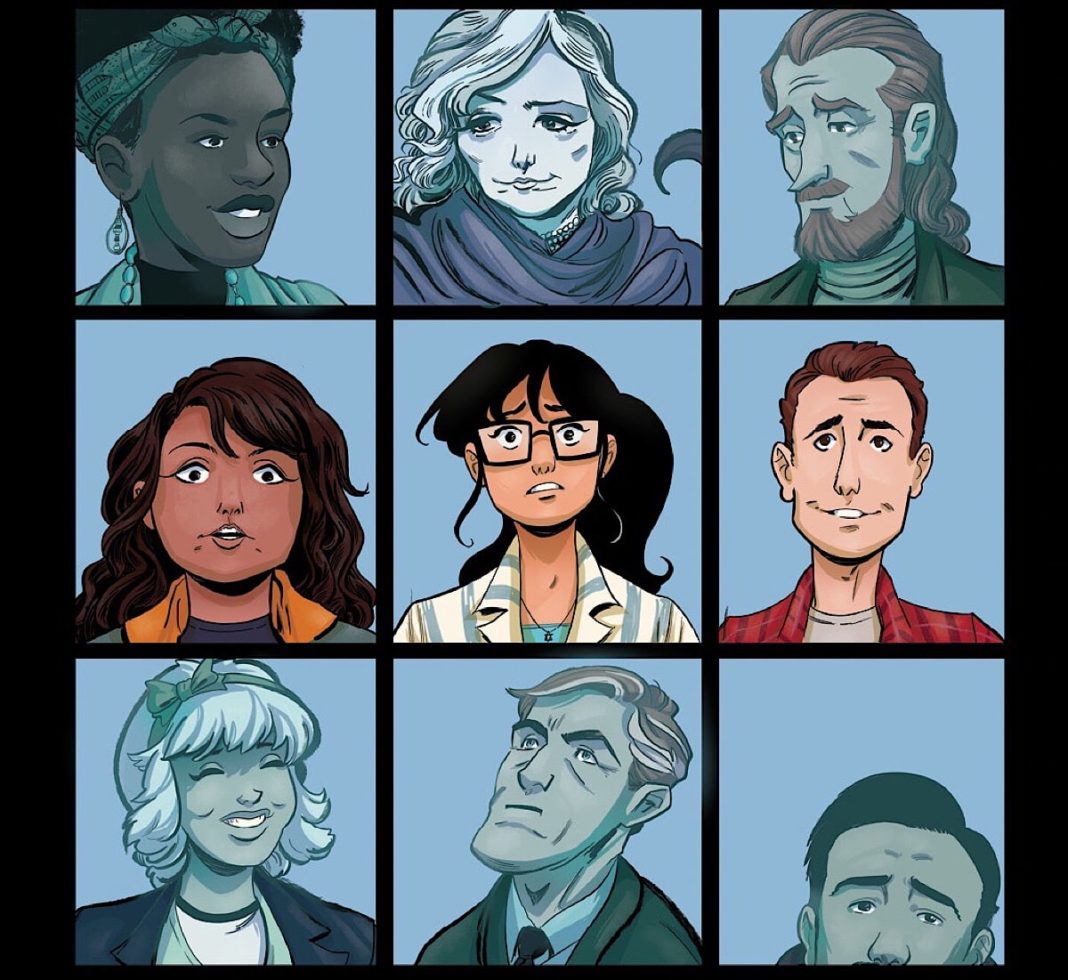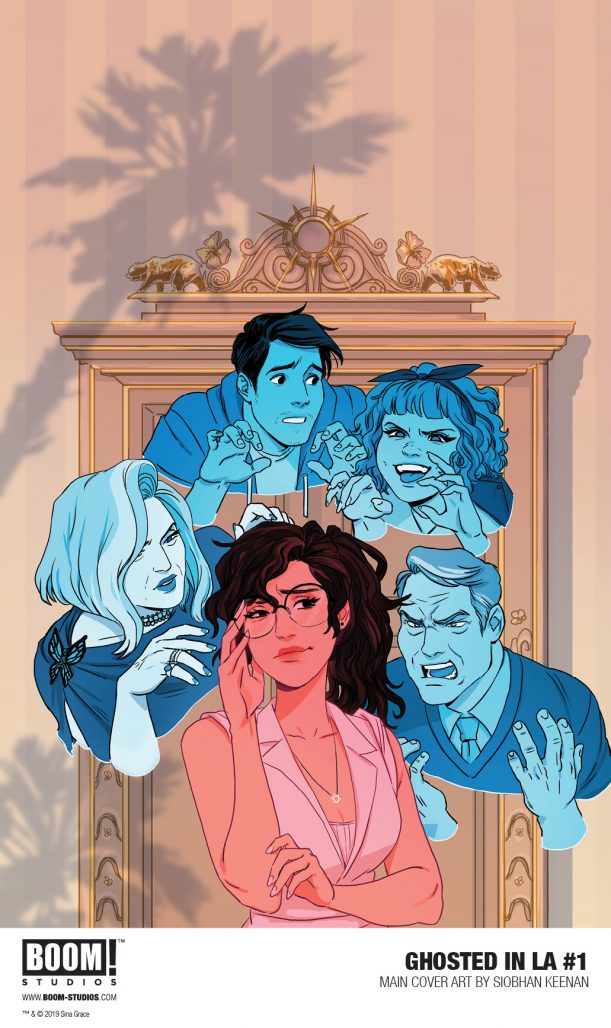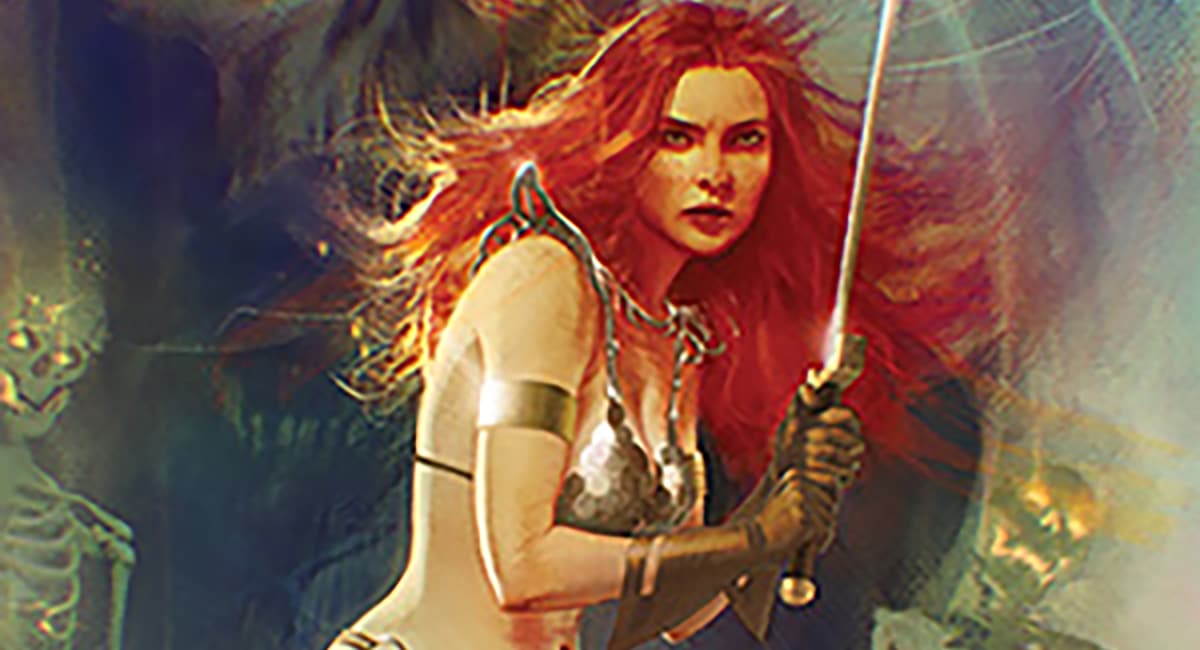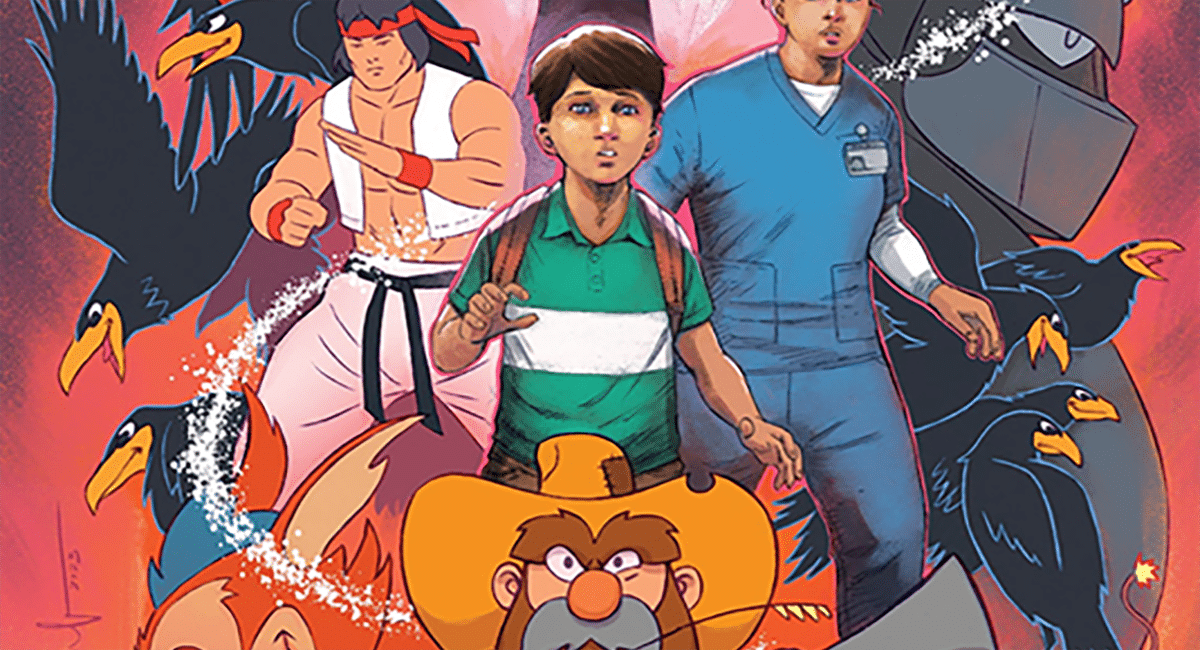By Nancy Powell
Sina Grace is known for his slice-of-life comics Nothing Lasts Forever and Self-Obsessed. With Ghosted in LA, Grace turns his keen eye on singles life in his hometown with warmth, humor and a hint of intrigue. Sina joined The Beat at WonderCon to chat about the importance of community and what it means to be nicecore.
Nancy Powell: So I hear you’re preparing to release a new book. Can you give us a little information about it?
Sina Grace: Yeah, the book is called Ghosted in LA. I’m going to be writing it as well as drawing flashback sequences throughout the entire series. It’s drawn by Siobhan Keenan who drew my Jem and the Holograms 2020 story at IDW and two Clueless graphic novels for Amber Benson and Sarah Kuhn at BOOM. She’s amazing and also doing all of this while getting her MFA, so she’s putting me to shame. But the story follows this girl, Daphne Walters, who moves from Missoula, Montana to LA to follow her high school sweetheart to college. He promptly breaks up her so she is now single and alone and doesn’t have any friends in LA, and through plot devices finds herself in a apartment complex occupied entirely by ghosts.
So we like to call it Melrose Place, but with ghosts and far less sex and scandal. But I’m really excited to take humans and ghosts and build a world with the both of them because there will be some romance between some of the humans and some of the ghosts. At first I was like “How do I do that?” And now I’m like, “Oh I know how I do that.” It’s really exciting. It’s a cool series.
Powell: You mention Melrose Place. Were you a big fan?
Grace: I lowercase “l” liked Melrose Place. I thought it was really cool. It was a little too pulpy. It would jump the shark a little too much. So for me, this is the version I would watch if instead of everyone stabbing each other’s backs they’re trying to learn how to be better friends to each other and how to be a family for each other. Everyone in this apartment complex is ostensibly single, and the apartment complex I live in is full of a lot of single people. I just I wanted to show the heart and the love and the humor behind a bu nch of lonely, haunted hearts.
That being said, there will be some really weird, kooky love triangles, and there will be some really weird dynamics that I can’t quite get into. But yeah, that’s where my head is at with it.
Powell: Is any part of the story based on any real life experience?
Grace: Yeah, I’m born and raised in Los Angeles. When I started this conversation at BOOM, one of the bits of value they found in having me do a story like this and having it set in Los Angeles is that I’m from there and I have a completely different experience with the city than most other people do. What’s really great is I get to finally show my city off through Daphne’s lens because she has no experience in LA. She’s going to get access to this world through the tenants of Rycroft Manor that again is less about the Hollywood sign and less about these buildings that you’re supposed to take a selfie outside of. I get to show LA for it being everything, not just its seedy underbelly, not just the glitz and glam, but for being a real, living, breathing city.
I’m excited about that. I have been ghosted. I have ghosted. I have made entire books about ghosts of relationships past. This is definitely a playground that I’ve spent a lot of time massaging or working with or some other better metaphor that I didn’t just fumble. So I’m really excited to kind of play with LA, play with the idea of being single. I think it’s changing constantly especially with the Internet, to take all the symbolism that comes with ghosts and and apply that through a very modern lens. I’m excited. that’s all I can say.
Powell: In the past you’ve primarily been known for your slice-of-life comics. How difficult was it to transition from that to doing something fictional?
Grace: I never personally experienced any pushback or problems with sort of that transition. For the most part, I have always been first and foremost just someone who loves comic books. You know my first job was working at a comic store. I edited comic books for Robert Kirkman’s Skybound imprint at Image. I self published so I never saw any obstacles in front of me because I just thought, well don’t we all love comic books? Isn’t that why we’re here?
But I’ve learned after doing Iceman that people who embraced all the slice-of-life memoir are a small, small drop in this massive bucket. And all I can say is I think it’s just been nice to constantly feel rediscovered, and that’s a cool feeling.
Powell: So what are some of plot devices you use in your new book?
Grace: The thing I’m most excited about with Ghosted in LA is the ability to play with an ensemble cast and to do something over the course of several issues. I can say how BOOM has basically been very gracious in letting me kind of tell a full story with the cast. I love that I can drop something in page 3 or 4 of Issue 1 and have it pay off in Issues 5 or 6 because with Iceman it was a fly-by-the-seat-of-your-pants or there are no guarantees or hey, we have to have a tie-in with this story over there. It’s nice to have this creative control and the support of my editors At BOOM: Shannon Watters and Mike Moccio. They’re super awesome, and they know how to help me take this thing I wanted to do and make it better. The other cool thing about it is there’s just like a lot of world-building at play. There are questions to be asked, like why are there ghosts, and why are there these ghosts? How come they’re in this building? There’s millions of fantastical elements to it and questions being asked and answering some of them and choosing when I answer them. It has been a real delight, like an unexpected delight of making this book.
Powell: I like this idea about ghosts. LA definitely has a storied history. Any specific ghosts from legend?
Grace: Well, that’s what’s exciting. I won’t spoil too much, but I did do some research before landing on what ghost logic I wanted to use and what ghost lore I wanted to apply to the series. I’m creating my own rules because I think I’m going to be able to do a lot more in terms of meditating on the idea of being single. Is that a good thing or a bad thing in the end if you’re a ghost? Are you left behind, or are you choosing to be solitary, especially in Los Angeles? I think there are so many people who do get lost in the shuffle. What does it mean to get to be found in that sense? So I’m going to be playing with it in all sorts of ways. I will say that there is a difference between a ghost and a ghoul in my book, and that’s that’s all I can say for right now.
Powell: So what other projects do you have in the works?
Grace: Yeah. So Ghosted in LA is definitely taking up a lot of my time because not only am I drawing the flashback sequences, I’m doing covers for every issue. Also, I really love working with Siobhan. I take pictures in every neighborhood and I’m like this is your inspiration and she’s like, thank you, I’m adding it to the Pinterest board.
But then also in my free time I’m co-writing Go Go Power Rangers with Ryan Parrott, also at BOOM, and I’m doing a Haunted Mansion graphic novel for IDW. We’ll be launching Jughead’s Time Police in June over at Archie Comics, so it’s a bit of a busy chapter for me.
Powell: Jughead and some of your other books seem kind of diametrically opposed to each other.
Grace: You think? I feel like I feel like everything I do is always about like smart alecks.
Powell: Jughead has that cartoony component. I don’t think your work as cartoony by any sense.
Grace: I accept that, and that’s what’s fun about Jughead. I think I like I I finally found a word that describes how I feel about myself, which is nicecore, like the TV show The Good Place is called nicecore where everyone’s nice to each other. Schitt’s Creek is also an example of nicecore. And that’s kind of what I thought Iceman was…just about people learning to love each other and learning to love themselves better. So at the end of the day whether there’s a bit of an edge or whether there’s a darkness to my stories, I always hope that there is that niceness or that there is a sense of levity or hope at the end of it.
And that’s what the connective tissue of all these projects is. Even if I’m dealing with silly Disney ghosts or if I’m dealing with these sort of ghosts with chips on their shoulders as in Ghosted in LA, or dealing with time travel shenanigans, the connective tissue is that it’s always about people learning to be there for each other.









